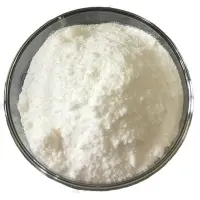Nature: new immune cells contribute to tumor immunotherapy
-
Last Update: 2020-02-24
-
Source: Internet
-
Author: User
Search more information of high quality chemicals, good prices and reliable suppliers, visit
www.echemi.com
February 24, 2020 / BIOON / -- immunotherapy shows great hope for cancer treatment But so far, this method is only effective for a small number of cancer patients (about 20%) In order to improve the therapeutic effect, researchers are looking for new ways to mobilize the immune system to destroy tumors Most immunotherapy drugs work on an immune cell called a T cell Drugs called checkpoint inhibitors release the cells' brakes and stimulate them to attack the tumor The researchers learned that checkpoint inhibitors seemed to work best in patients with pre-treatment T-cell infiltration in tumor tissue Due to the lack of T cells in most tumor tissues So to design an immunotherapy for more people, researchers have been looking for other types of immune cells to fight cancer Recently, a team from MSK found a group of immune cells called ILC These cells exist in many different tissues and appear to have mild antitumor effect in normal resting state Researchers have shown that drug activation of ILC can mobilize T cells to reduce the size of pancreatic cancer tumors "We believe that this is an important discovery for pancreatic cancer research and for cancer immunotherapy as a whole," said Vinod balachandran, a surgical scientist affiliated to the pancreatic cancer research center We are learning how to use a variety of immune systems to fight cancer We think this marks the beginning of a new immunotherapy The results were published recently in nature As part of the innate immune system, ILC was discovered only 10 years ago, so they are not the focus of immunotherapy Now, innate immune cells are attracting more interest in cancer research Dr balachandran and colleagues studied whether and how these cells play a role in the body's response to cancer Compared with normal organs, the number of ilc2 cells in pancreatic tumor tissue is more, which indicates that they react to tumor The researchers also found that patients with more ilc2 in pancreatic cancer tissues lived longer, suggesting that ilc2 might have cancer fighting properties Then, the team tested whether ilc2 could help control tumors in mice The results showed that the removal of ilc2 could lead to faster growth of pancreatic tumor "We think that if these cells have a tendency to prevent cancer, maybe we can find a way to activate them," Dr balachandran said Ilc2 has receptors on its surface that control its own reproduction The researchers found that ilc2 was activated with IL-33, allowing them and T cells to expand, leading to tumor shrinkage In mice without ilc2, IL-33 stimulation did not cause tumor shrinkage, which proved that ilc2 was the key cell to mediate this effect Then, the team looked for ways to further enhance the antitumor activity of ilc2 Checkpoint proteins on the surface of T cells act as brakes to prevent them from attacking the body's own tissues But it also limits the antitumor activity of T cells Because ilc2 is related to T cells, Dr balachandran's team wanted to know if checkpoint proteins also work on ilc2 They found that when activated by IL-33, ilc2 expressed an important checkpoint protein, PD-1, on its surface When the researchers gave the mice IL-33 plus PD-1 inhibitors, the tumor shrank more significantly Activation of ilc2 by adding IL-33 seems to be the key to the effective resistance of PD-1 checkpoint inhibitors to pancreatic tumors in mice Dr balachandran is currently developing a drug that can activate human ilc2 "This is a novel therapy that can be used in combination with the most successful immunotherapy we have today." Source of information: newly discovered immune cell type may be key to improving pancreatic cancer immunetherapy source: John Alec moral et al, ilc2s efficient PD-1 blockade by activating tissue specific cancer immunity, nature (2020) Doi: 10.1038/s41586-020-2015-4
This article is an English version of an article which is originally in the Chinese language on echemi.com and is provided for information purposes only.
This website makes no representation or warranty of any kind, either expressed or implied, as to the accuracy, completeness ownership or reliability of
the article or any translations thereof. If you have any concerns or complaints relating to the article, please send an email, providing a detailed
description of the concern or complaint, to
service@echemi.com. A staff member will contact you within 5 working days. Once verified, infringing content
will be removed immediately.







